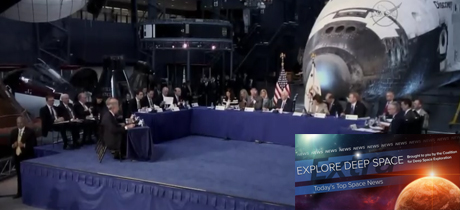In Today’s Deep Space Extra… U.S. Vice President Mike Pence will chair the first session of the re-established National Space Council today. NASA is providing coverage of the National Space Council starting at 10 a.m. ET. Click here to view.
Coalition member companies will be represented at the NSC meeting. A statement will follow after the event.
Human Space Exploration
America will return to the moon and go beyond
Wall Street Journal (10/4): In an op-ed, U.S. Vice President Mike Pence declares America’s pre-eminence in space under threat, as it was before the launch of Sputnik-1, the first artificial satellite, by the former Soviet Union 60 years ago Wednesday. The nation will respond, wrote Pence on the eve of the first meeting of the re-established White House National Space Council, the cabinet-level panel he will chair to shape the nation’s future national security, civil and commercial space policy.
Here’s what to expect from Trump’s Space Council meeting this week
Ars Technica (10/4): National Space Council discussions will address the current status of orbiting space debris, satellite traffic management, licensing of commercial space activities as well as the nation’s space exploration objectives. Might the re-emergence of a cabinet-level space council add another layer of bureaucracy to U.S. space activities? Some believe so.
Space Council meeting features three panels of experts
Spacepolicyonline.com (10/4): Revived by President Trump in late June, the White House National Space Council will meet for the first time under the leadership of Vice President Mike Pence on Thursday. On Wednesday, the White House announced it will air the proceedings live on NASA’s website as well as its own. Expert panels will focus on civil, commercial and national security space priorities. The council has been inactive since the early 1990s.
Major core stage hardware completed for first SLS flight
Spaceflightinsider.com (10/4): Major elements of the core for the inaugural test launch of NASA’s Space Launch System (SLS), the massive rocket intended to start U.S. explorers on new missions of deep space exploration, are complete. NASA is evaluating a launch date for Exploration Mission-1, an uncrewed mission that will see the SLS start an Orion capsule on a journey around the moon and back to Earth for recovery.
Space Science
Dimming of Tabby’s Star likely caused by something less sexy than aliens
Ars Technica (10/4): KIC 8462852 is the formal name for a distant star in the constellation Cygnus. It also has a more intriguing name, Tabby’s Star, a reference to the astronomer who proposed that an observed obstruction might be a structure fashioned by an intelligent civilization. However, new data gathered by NASA’s Spitzer and Swift space observatories suggests the veil is dust.
Sky and Telescope (10/4): Venus and Mars, which circle the sun on either side of the Earth, appear close in the early morning sky through the weekend. Look to the East before sunrise.
Other News
World celebrates 60th anniversary of space era’s launch
TASS of Russia (10/4): Russia was joined Wednesday in marking the 60th anniversary of the historic launch of the first artificial satellite, the former Soviet Union’s Sputnik 1. But what became of the spacecraft credited with igniting the Space Age? Its mission came to an end 92 days after the October 4, 1957 launch. On January 4, 1958 Sputnik 1 re-entered the Earth’s atmosphere and burned up.
China resumes launch campaigns after string of failures, delays lunar mission
Spaceflightnow.com (10/4): Until reversed last week, China was confronted by a string of rocket launch failures dating to late last year. Three satellites launched aboard a single rocket were the first since early July. While Beijing is on the rebound, however, there are no plans by China to proceed with the planned launch of a much anticipated lunar sample return mission in November.
High winds force scrub of NROL-52 launch
Spaceflightinsider.com (10/4): Strong winds early Thursday forced a delay in the planned launch of a United Launch Alliance Atlas 5 from Cape Canaveral Air Force Station, Florida, with a national security payload. A second attempt is planned for Friday at 4:03 a.m., EDT.

